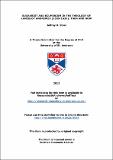Files in this item
Eucharist and ecumenism in the theology of Lancelot Andrewes (1555-1626) : then and now
Item metadata
| dc.contributor.advisor | Brown, David | |
| dc.contributor.author | Steel, Jeffrey | |
| dc.coverage.spatial | 250 | en_US |
| dc.date.accessioned | 2012-07-25T14:11:08Z | |
| dc.date.available | 2012-07-25T14:11:08Z | |
| dc.date.issued | 2012-05-22 | |
| dc.identifier | uk.bl.ethos.555597 | |
| dc.identifier.uri | https://hdl.handle.net/10023/3019 | |
| dc.description.abstract | This thesis is an examination of Lancelot Andrewes’ (1555-1626) Eucharistic theology which is explored in order to see how far he might act as a catalyst for ecumenism with Rome on the topic of Eucharistic sacrifice. The purpose of the thesis is to develop a fuller exposition of Andrewes’ Eucharistic theology as a unique theologian who maintained a view of sacrifice that was denied by Protestants on the continent of Europe and by most within the English Church of his day. In the first four chapters Andrewes’ own views are not always juxtaposed to more contemporary views. This is intentional in order to develop his own thought before looking at him as an ecumenical partner on sacrifice. The first chapter explores Andrewes as a theologian within his own context of ecclesiology, placing Andrewes within a more Catholic framework as opposed to Puritanism that was becoming politically influential during the reign of King James I. The second chapter then looks at Andrewes’ view of Eucharistic instrumentality where I characterise him as an ‘effectual instrumentalist’ over against some contemporary scholars who place him alongside John Calvin who is sometimes described as a ‘symbolic instrumentalist’. I find Andrewes closer to a Catholic framework of instrumentalism. The third chapter further explores Andrewes’ view of presence where I conclude that he should be characterised as one holding to an objective view of presence and give him the Cappodocian label as a Transelementationist. This is to emphasise that Andrewes did encourage the faithful to look for Christ in the elements themselves, which goes beyond Christ’s presence within the faith of the believer alone. The fourth chapter is the lengthiest chapter as it develops Andrewes’ views of sacrifice. I see him as someone immersed in the sacrificial nature of the Eucharist defined within the writings of the Fathers of the first five centuries. It was here that Andrewes is able to be set fully within the framework of a Catholic view of the mystery as the Christian sacrifice offered to God in return for the gift of the Christ-event to the world. Andrewes’ description of the offering as containing a propitiatory effect in the application of the forgiveness of sins through ‘instrumental touching’ was a unique understanding of someone in the Church of England during the sixteenth and early seventeenth centuries. In the final chapter, I juxtapose Andrewes with Catholic teaching as it is explored in contemporary Catholic theology as well as, perhaps more importantly, within papal documents and authoritative Catholic statements on the sacrifice of the Mass. This is to show how similar Andrewes is in his description of the sacrifice of the Eucharist to Rome and how he goes further in that direction than any of his contemporaries or even modern ecumenical statements in Anglican and Roman Catholic dialogue. | en_US |
| dc.language.iso | en | en_US |
| dc.publisher | University of St Andrews | |
| dc.rights | Creative Commons Attribution-NonCommercial-NoDerivs 3.0 Unported | |
| dc.rights.uri | http://creativecommons.org/licenses/by-nc-nd/3.0/ | |
| dc.subject | Eucharist | en_US |
| dc.subject | Sacrifice | en_US |
| dc.subject | Andrewes | en_US |
| dc.subject | Ecumenism | en_US |
| dc.subject.lcc | BX5199.A6S8 | en_US |
| dc.subject.lcsh | Andrewes, Lancelot, 1555-1626 | |
| dc.subject.lcsh | Lord's Supper--Sacrifice--History of doctrines--17th century | en_US |
| dc.subject.lcsh | Christian union--History--17th century | en_US |
| dc.title | Eucharist and ecumenism in the theology of Lancelot Andrewes (1555-1626) : then and now | en_US |
| dc.type | Thesis | en_US |
| dc.type.qualificationlevel | Doctoral | en_US |
| dc.type.qualificationname | PhD Doctor of Philosophy | en_US |
| dc.publisher.institution | The University of St Andrews | en_US |
| dc.publisher.department | St Mary's College Divinity | en_US |
This item appears in the following Collection(s)
Except where otherwise noted within the work, this item's licence for re-use is described as Creative Commons Attribution-NonCommercial-NoDerivs 3.0 Unported
Items in the St Andrews Research Repository are protected by copyright, with all rights reserved, unless otherwise indicated.


